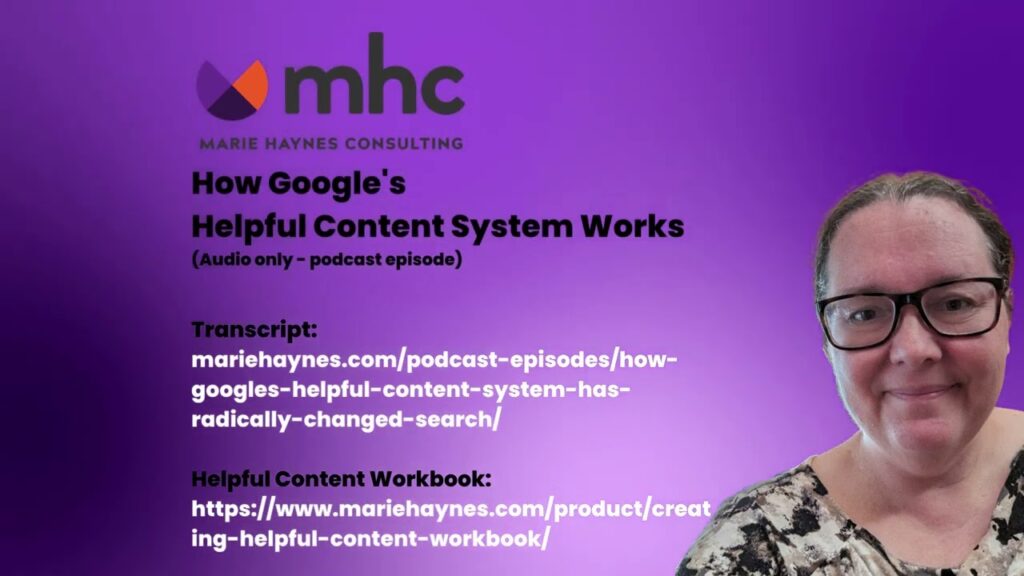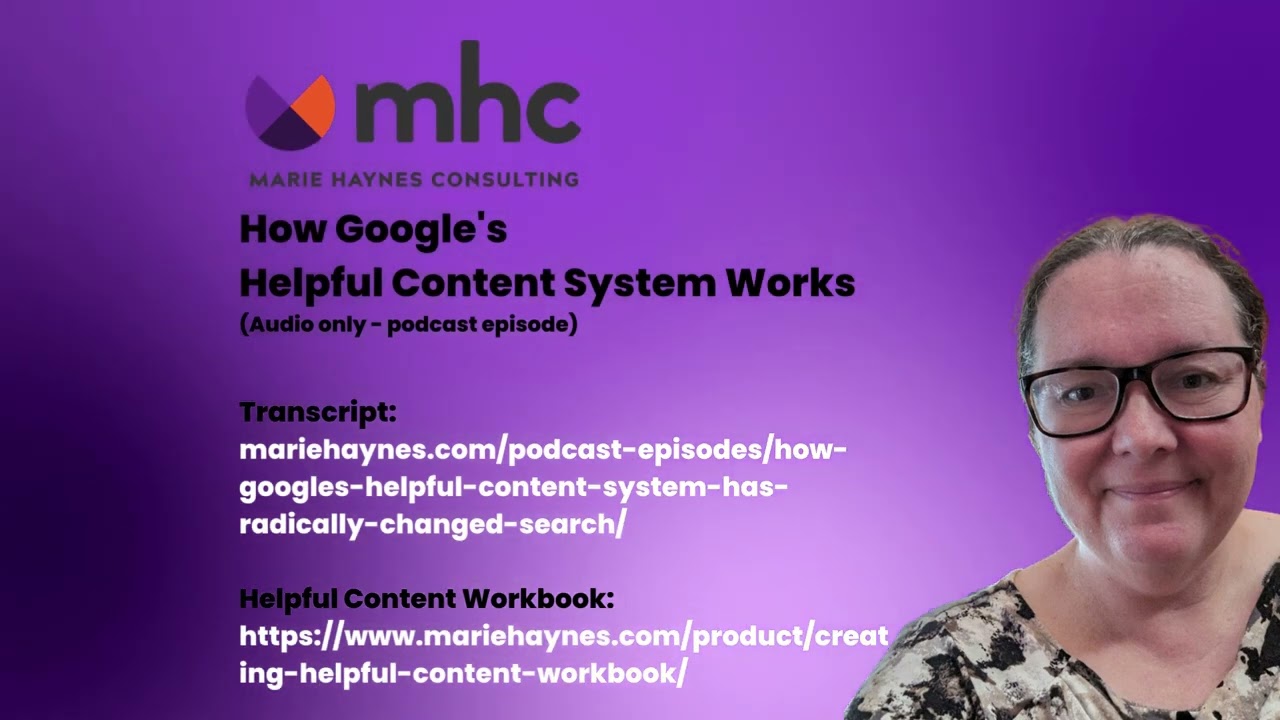In this highly anticipated episode of Search News, Dr. Marie Haynes dives deep into the topic of how Google’s helpful content system has revolutionized search rankings. With over 16 years of experience studying Google’s algorithms, Dr. Haynes sheds light on the shift towards AI systems, like helpful content, and the decreasing reliance on links and keywords. She discusses the significant role of major algorithm updates like Panda and Penguin in shaping content quality and offers real-world examples of sites impacted by these updates. The episode also provides valuable advice for those struggling with helpful content suppression and aims to help websites align with Google’s criteria for improved visibility and traffic. Don’t miss this enlightening exploration of modern search rankings and the importance of prioritizing content quality.
In a long-awaited return to Search News, Dr. Marie Haynes discusses the profound impact of Google’s helpful content system on search rankings. Drawing from years of studying Google’s algorithms, Dr. Haynes takes listeners on a journey through the evolution of major updates like Panda and Penguin, highlighting their implications for content quality. With real-world examples, she demonstrates how machine learning models now predict helpful content with the aid of quality raters’ training data. Dr. Haynes provides valuable insights and advice for those struggling with helpful content suppression, emphasizing the need to align website content with Google’s evolving criteria. If you’re looking to grasp the intricacies of modern search rankings and boost visibility and traffic, this episode is a must-listen.
Dr. Marie Haynes discusses the impact of Google’s helpful content system on search rankings

Introduction to the episode of Search News
In this long-awaited return episode of Search News, Dr. Marie Haynes explores the significant impact of Google’s helpful content system on search rankings. She delves into the evolution of Google’s algorithms, with a specific focus on major updates like Panda and Penguin. Dr. Haynes emphasizes the importance of aligning websites with Google’s criteria and prioritizing content quality for improved visibility and traffic.
Dr. Haynes’ expertise in studying Google’s algorithms
Dr. Marie Haynes is a renowned expert in the field of search engine optimization (SEO), with 16 years of experience studying Google’s algorithms. She began her journey in SEO when she created a website to provide reliable veterinarian advice. Over the years, Dr. Haynes has dedicated her time to understanding how Google works and helping others optimize their websites for better search rankings. Her expertise has allowed her to analyze struggling websites and provide valuable insights into Google’s algorithm updates.
Evolution of major algorithm updates like Panda and Penguin
Dr. Haynes discusses the significant impact of major algorithm updates like Panda and Penguin on search rankings and content quality. Panda, which was released in 2011, focused on improving content quality by penalizing low-quality, thin, and duplicate content. This update highlighted the importance of creating valuable and relevant content for users. Penguin, on the other hand, targeted manipulative link building techniques, emphasizing the need for high-quality, natural links. Dr. Haynes also delves into the role of the disavow tool and manual actions in addressing unnatural links and improving website rankings.
Machine learning models and predicting helpful content
With the introduction of machine learning models, Google can now predict helpful content more accurately. These models analyze characteristics that make content helpful or unhelpful, using training data from quality raters. In November 2022, Google launched the helpful content system, which significantly impacted numerous websites and their search rankings. Dr. Haynes explains how this system rewards consistently helpful content and demotes content that is deemed unhelpful. The examples she provides illustrate the far-reaching effects of the helpful content system on search rankings and website visibility.
Real-world examples of sites impacted by helpful content updates
Dr. Haynes shares real-world examples of websites that have been impacted by Google’s helpful content system. These examples highlight the specific changes made by Google and the resulting impact on the sites’ search rankings. By examining these cases, website owners can gain valuable insights into the factors Google prioritizes and how they can align their content with those standards.
Specific changes rewarded by Google
Google’s emphasis on helpful content has reinforced the importance of creating content for people rather than solely focusing on search engine optimization. Content that is tailored to an existing or intended audience is more likely to meet searchers’ needs and receive higher rankings. Additionally, Dr. Haynes discusses the significance of author bios and expertise in establishing content quality and credibility. Authors who demonstrate expertise and authority in their respective fields tend to produce more valuable and reliable content.
Advice for struggling with helpful content suppression
For those facing challenges with helpful content suppression, Dr. Haynes provides valuable advice on understanding the classification of sites with unhelpful content. She outlines steps for recovery, including removing unhelpful content and improving the overall helpfulness of the site’s content. By aligning with Google’s criteria and focusing on content quality, websites can regain their visibility and improve their rankings.
Aligning websites with Google’s criteria
Dr. Haynes emphasizes the importance of aligning websites with Google’s content quality guidelines. By prioritizing content quality, website owners can improve their visibility and traffic. Dr. Haynes highlights the need to focus on quality signals and create content that meets the needs of searchers. By understanding and adapting to Google’s algorithms, website owners can optimize their sites for better search rankings.
Importance of prioritizing content quality for visibility and traffic
Dr. Haynes explains the consistent pattern observed in Google’s updates, where pages that meet the needs of searchers are elevated in rankings. While Pagerank and links remain important signals for Google, the introduction of the helpful content system represents a more advanced model for determining helpfulness. Machine learning plays a crucial role in building this model, enabling Google to analyze various characteristics that contribute to content’s helpfulness. By focusing on content quality and prioritizing the needs of users, websites can improve their visibility and attract more organic traffic.
Promotion of Dr. Haynes’ workbook for content assessment and improvement
Dr. Haynes promotes her workbook, which aims to help website owners assess their content and make improvements based on Google’s content quality guidelines. This resource provides practical insights and strategies for optimizing content and aligning with Google’s criteria. By utilizing the workbook, website owners can gain a better understanding of what makes content helpful and improve their overall search rankings.
Conclusion
Dr. Marie Haynes sheds light on Google’s helpful content system and its profound impact on search rankings. By aligning with Google’s criteria and prioritizing content quality, websites can improve their visibility and attract more organic traffic. The episode emphasizes the importance of understanding and adapting to Google’s algorithms and highlights Dr. Haynes’ expertise in analyzing struggling websites. With the right strategies and approaches, website owners can recover from the impact of the helpful content system and improve their rankings. Dr. Haynes’ insights and advice offer valuable guidance for optimizing content and achieving success in the ever-evolving world of search engine optimization.
